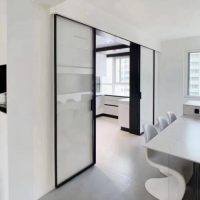The world of interior design and architecture is continually evolving, with a growing emphasis on creating flexible and versatile living and working spaces. Frameless Sliding Partition System have emerged as a cutting-edge solution, offering not only functional benefits but also a sleek, contemporary aesthetic. In this blog post, we will explore the concept of frameless sliding partition systems, highlight their key advantages, and provide insight into how they are redefining the way we utilize and style our spaces.
Understanding Frameless Sliding Partition Systems
Frameless sliding partition systems, often referred to as frameless glass partitions or frameless glass walls, are innovative architectural elements designed to divide and connect spaces within a structure. They are characterized by large, transparent glass panels that are seamlessly integrated with minimalistic frames and a sophisticated sliding mechanism. Unlike traditional walls or partitions, these systems offer the flexibility to create open, airy spaces while maintaining the option to separate areas when needed.
Key Features of Frameless Sliding Partition Systems
-
Glass Panels: Frameless sliding partition systems primarily consist of clear glass panels. These panels are often made from tempered or toughened glass to ensure durability and safety.
-
Minimalistic Frames: The frames surrounding the glass panels are minimal, sleek, and often nearly invisible, creating a seamless, frameless appearance that maximizes transparency.
-
Sliding Mechanism: These partition systems use a top-hung or bottom-rolling sliding mechanism, allowing the glass panels to glide smoothly and effortlessly to open or close the space.
-
Versatility: Frameless sliding partition systems can be customized to fit various architectural styles, sizes, and configurations. They can accommodate both single and double-glazed panels, with options for fixed or moveable panels.
Advantages of Frameless Sliding Partition Systems
- Maximized Natural Light
One of the standout advantages of Sliding Door System is their ability to flood interior spaces with natural light. The large, clear glass panels allow daylight to permeate every corner, creating a welcoming, well-lit atmosphere. This is particularly beneficial in homes, offices, and commercial spaces where abundant natural light is highly sought after.
- Space Optimization
In today’s urbanized environments, space optimization is key. Frameless sliding partition systems offer the advantage of creating multifunctional spaces. When the panels are open, a single, open area can serve multiple purposes, such as a spacious living room during the day and a private bedroom at night.
- Visual Continuity
The minimalistic frames and transparent glass panels maintain visual continuity, making spaces appear larger and more connected. This can be especially beneficial in smaller homes and apartments, where a sense of openness can create a more comfortable and spacious feeling.
- Enhanced Flexibility
Frameless sliding partition systems offer a versatile solution for creating spaces that can be adapted to various requirements. Whether you need an open floor plan for a large gathering or a private office space within a larger room, these partitions can be easily adjusted to suit your needs.
- Sound Insulation
While the glass panels of frameless sliding partition systems maintain visual transparency, they also provide effective sound insulation. This ensures privacy and a quiet environment, making them ideal for offices, meeting rooms, or areas where noise control is essential.
- Modern Aesthetics
The contemporary and minimalist design of frameless sliding partition systems complements a wide range of interior styles. They add a touch of modern elegance to any space, creating a timeless and sophisticated look.
Applications of Frameless Sliding Partition Systems
- Residential Spaces
Frameless sliding partition systems are widely used in homes to create flexible living spaces. They can separate a living room from a dining area, provide privacy for a home office, or create open-plan kitchens that can be partitioned off when needed.
- Commercial Environments
In offices and commercial spaces, these partition systems are employed to configure open-concept workspaces and collaborative areas. They can also be used to divide meeting rooms or create private offices.
- Retail Stores
Retailers often use frameless sliding partition systems to create flexible store layouts. These partitions can easily adapt to changing merchandising needs, allowing for a dynamic and inviting shopping experience.
- Hospitality Industry
Hotels and resorts utilize frameless sliding partition systems to create multifunctional spaces. They can transform a ballroom into smaller event spaces, or divide a suite into separate living and sleeping areas while maintaining a sense of openness and luxury.
Conclusion
Frameless sliding partition systems represent a contemporary and versatile approach to interior design and architecture. Their ability to maximize natural light, optimize space, maintain visual continuity, and enhance flexibility has made them a sought-after choice for modern living and working spaces. These systems offer the best of both worlds – the openness of open floor plans and the privacy of traditional partitions – providing a tailored, functional, and stylish solution for a variety of environments. In a world where adaptability and aesthetics are paramount, frameless sliding partition systems are redefining the way we design and experience our spaces.





